Utility Department
The Town of Lakewood Village Utilities Department provides essential municipal services including water, wastewater (sewer), and garbage collection. The Town owns and operates its own water production and wastewater treatment facilities, while garbage service is contracted through Allied Waste. Residents receive a single monthly bill that itemizes water, wastewater, and garbage charges.
All homes in Lakewood Village are required to connect to Town water service—private wells are not permitted. Waterfront property owners may irrigate from Lake Lewisville, but only with permits obtained from Dallas Water Utilities and the U.S. Army Corps of Engineers.
Before utilities can be connected, each property must pass a Certificate of Occupancy inspection. New customers must also complete a utility application form and pay a refundable deposit. The deposit is applied back to the account when service is closed and the balance is paid in full.
💧 Pool Repair Water Credit
Apply for Credit
Customers who refill their pools after completing leak repairs may be eligible for a credit that offsets higher-tier water charges.
The credit bills the refill volume at the second-tier water rate (per the Town’s Consolidated Fee Ordinance) and credits back the difference from any higher tier.
Eligibility Criteria
- Proof of Repair: Provide documentation of pool leak repairs (licensed contractor receipt, repair material invoice, or a signed homeowner statement describing the work).
- Application Deadline: Submit the application within 30 days of refilling the pool. Include:
- Proof of repair (as above)
- Refill date(s)
- Meter readings before and after the refill
- Inspection: The Town may inspect the pool and documentation to verify eligibility.
- Usage Limit: Credit applies only to water used to refill the pool, up to the pool’s stated maximum capacity.
- Frequency: One credit per customer per calendar year.
Calculation of Credit
- The refill volume is billed at the second-tier rate defined in the Consolidated Fee Ordinance.
- The Town credits the difference between any higher tier charge and the second-tier rate for that refill volume.
Conditions
- Customers must maintain pools to prevent recurring leaks; repeated claims tied to lack of maintenance may be denied.
- Misuse or fraudulent claims may result in disqualification from the program.
Questions? Contact the Town of Lakewood Village at 972-294-5555 or
💦 Finding a Water Leak
A dripping faucet is easy to spot, but hidden leaks can waste hundreds of gallons before you notice. If you suspect water is vanishing from your home or yard, follow these steps to track down the culprit.
1) Confirm No Water is Running
Make sure all faucets, appliances, sprinklers, and outdoor hoses are off. Even small uses can affect the test.
2) Locate Your Water Meter
Most meters are in the front yard, about 15–20 feet from the street. Open the box carefully (watch for insects). Look for the flow indicator — often a small red or triangular dial. If it moves when no water is in use, there may be a leak. If no indicator is present, watch the large sweep hand instead.
Tip: Record your meter reading, wait 30–60 minutes with no water use, then check again. Any change suggests a leak.
3) Test Toilets
Toilets are the most common hidden leak. Shut off one toilet at a time at the wall valve, then recheck the meter. If the indicator stops, that toilet is the source. You can also place a few drops of food coloring in the tank: if color shows in the bowl without flushing, the flapper is leaking.
4) Check Irrigation & Outdoor Systems
Shut off the valve that serves your sprinkler or irrigation system. If the flow indicator stops, the leak is in the irrigation line. Underground irrigation leaks can be large but invisible because water seeps into the soil.
5) Inspect Inside the Home
- Look under sinks, behind appliances, and around water heaters for dampness or mildew.
- Listen for running water when everything is turned off.
- Check walls and ceilings for discoloration or soft spots.
6) Walk the Yard
Look for unusually green patches of grass, soggy soil, or standing water. These may indicate an underground leak between the meter and your home.
When in Doubt
If you can’t find the source, contact a licensed plumber. Prompt attention saves water, money, and prevents property damage.
Questions? Contact the Town of Lakewood Village at
972-294-5555 or
🚰 Who Maintains Water & Sewer Service Lines?
A common misconception is that the Town maintains all the pipes in your yard. In reality, service lines to your home are private property. As the homeowner, you are responsible for keeping them in working order.
Ownership Responsibilities
Here’s where the line of responsibility is divided:
- Water: Homeowners are responsible for the pipe running from the house to the water meter (usually near the sidewalk). The Town maintains the meter itself (unless tampered with) and the pipe from the meter to the public water main.
- Sewer: Homeowners are responsible for the pipe from the house to the sewer main (typically in the middle of the street). The Town maintains the sewer main, which carries wastewater from multiple homes to the treatment plant.
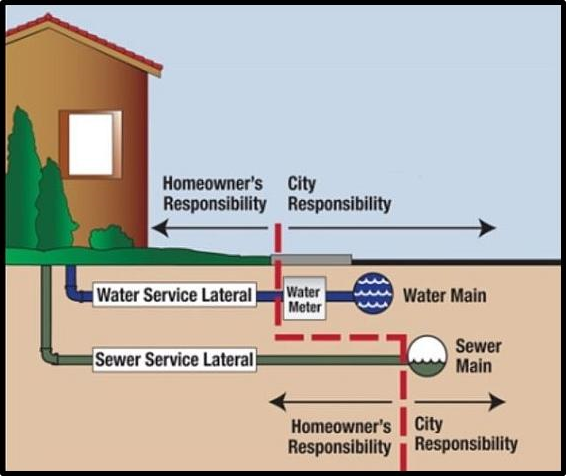
Preventing Costly Sewer Backups
Backups and overflows are unpleasant and expensive. You can help prevent them by following these steps:
- Avoid grease: Never pour fats, oils, or grease down drains. Wipe pans with a paper towel and dispose of it in the trash.
- Skip “flushables”: Do not flush wipes, diapers, or feminine hygiene products—even if labeled “flushable.” These products snag on roots or buildup and cause clogs. (Consumer Reports, WEF video)
- Mind your landscaping: Don’t plant trees or large shrubs near sewer lines. Roots will grow into cracks, forming blockages that require costly repairs.
- Buying a home? Ask for a sewer lateral inspection. A plumber’s video scope can reveal cracks, root intrusion, or pipe failures before you close on the property.
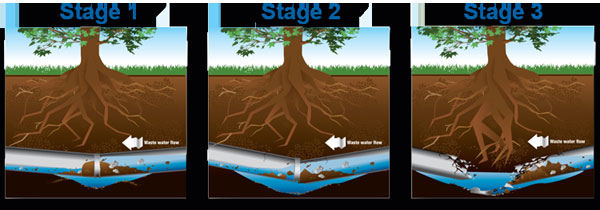
Remember: If a service line breaks or clogs between your home and the connection point, it’s the homeowner’s responsibility to repair it. Contact a licensed plumber for assistance.
Questions? Contact the Town of Lakewood Village at
972-294-5555 or
🗑️ Garbage & Recycling Collection
Trash and recycling service in Lakewood Village is provided by Allied Waste (Republic Services). Each household receives three 90-gallon containers that may be used in any combination for landfill or recycling.
Weekly Pickup
Collection occurs every Monday. Please place your containers at the curb by 7 a.m.
Be sure containers are at least 3 feet apart and clear of vehicles.
Quarterly Bulk Collection
Bulk pickup occurs quarterly on the second Saturday of February, May, August, and November.
- Up to 10 cubic yards (≈ three pickup truck loads).
- Unbundled brush clippings accepted.
- Non-hazardous materials only.
Please place brush and yard waste in a separate pile from landfill items. Allied uses different trucks to recycle yard waste apart from landfill material.
Helpful Notes
- Holiday Schedule: If a collection day falls on a major holiday, pickup may be delayed by one day.
- Container Care: Residents are responsible for keeping containers clean and in good condition.
For replacement containers, contact
This email address is being protected from spambots. You need JavaScript enabled to view it. . - Hazardous Waste: Items like paint, oil, and electronics are not accepted. See Denton County’s disposal programs for safe options.
Questions about garbage, recycling, missed pickups, or replacement containers?
Contact the Town of Lakewood Village at
972-294-5555 or
♻️ Recycling: Keep It Clean
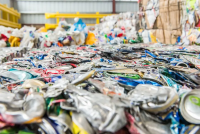
“Wishcycling” (tossing questionable items into the cart) can contaminate an entire load and send it to the landfill. The best way to help is to follow the basics and stick to locally accepted materials.
Remember: Empty. Clean. Dry. — no food or liquid, and no bagged recyclables.
What Usually Belongs
- Paper & Cardboard — mail, newspapers, cartons, and flattened boxes (remove liners and packing).
- Plastic Bottles, Jugs & Tubs — with caps back on after rinsing (labels can stay).
- Metal Cans — aluminum and steel food & beverage cans (lightly rinse).
- Glass Bottles & Jars — if accepted in your area; remove lids and rinse.
Keep These Out
- Plastic bags & film — do not bag recyclables; take clean bags/film to store drop-offs where available.
- Tanglers — hoses, cords, wires, string lights (jam sorting equipment).
- Food, liquids, & soiled items — greasy pizza boxes, half-full containers.
- Styrofoam®, foam trays, and clamshells — often not accepted curbside.
- Batteries & electronics — fire hazard; use dedicated drop-off programs.
- Yard waste — set out per bulk/brush guidance, not in the recycle cart.
Recycling rules can vary slightly by area. When in doubt, check the guide above or contact the Town at
972-294-5555 or
🗑️ Temporary Dumpster Rentals
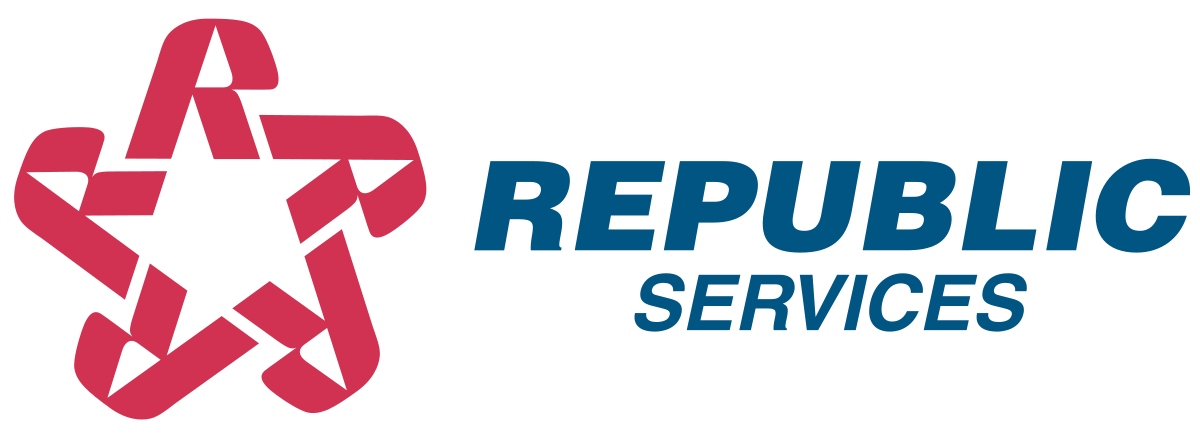
Tackling a remodel, major cleanout, or yard project? Republic Services offers a range of temporary dumpsters to fit your needs. Choose the size based on the type of waste you’re throwing out—household items like old furniture and appliances, construction debris such as wood and sheetrock, or yard waste including trees, shrubs, and soil.
Republic Services will deliver the dumpster, place it on your property, and haul it away once you’re done. Be sure to review weight limits and restrictions on prohibited items before booking.
Questions? Contact the Town of Lakewood Village at
972-294-5555 or
🚱 Water Service Disconnection & Reconnection
If your water service has been disconnected for non-payment, the account must be paid in full before service will be restored. Please note that late fees will continue to accrue until the balance is cleared.
Service will not be reconnected until all outstanding charges, including late fees, are paid. Payments should be made promptly to avoid further delays.
Questions? Contact the Town of Lakewood Village at
972-294-5555 or
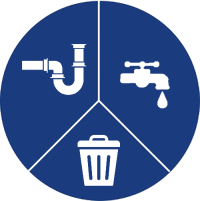
After Hours Emergency
(972) 292-0812
Payments
Online Payments
Payments by Check
Drop off at Town Hall
OR
Mail to: 100 Highridge Drive
Lakewood Village, TX
75068